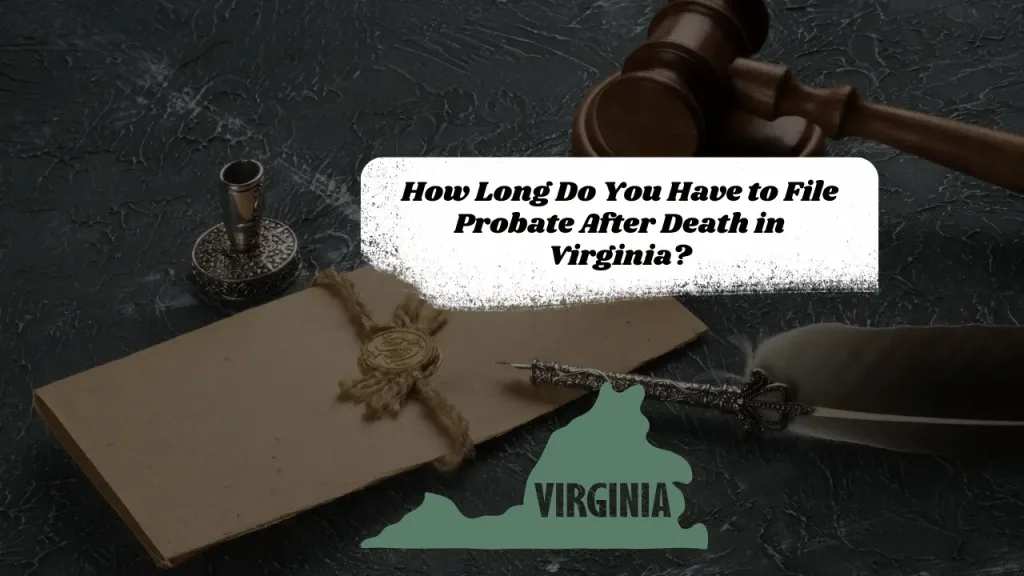How Long Do You Have to File Probate After Death in Virginia?
When a loved one passes away, handling their estate is an important responsibility. In Virginia, the probate process ensures that the deceased’s assets are distributed according to their will or state law. While Virginia does not have a strict deadline for filing probate, acting promptly is crucial to avoid complications. This guide explains the probate timeline, steps, and exceptions in Virginia, along with resources to help you through the process.
What Is Probate in Virginia?
Probate is the legal process of validating a will, paying debts, and distributing assets after someone dies. In Virginia, probate is handled by the Circuit Court in the county where the deceased lived. Not all estates require probate—assets with designated beneficiaries (e.g., life insurance policies or joint accounts) typically bypass this process. However, if the deceased owned property solely in their name, probate is usually necessary.
Virginia’s Probate Filing Timeline
No Strict Deadline, But Early Action Is Recommended
Virginia law does not set a specific deadline for filing probate after death. However, it is advisable to begin the process within 30 days of the death. Delaying probate can lead to issues such as:
- Unpaid debts or taxes.
- Difficulty locating or managing assets.
- Potential disputes among heirs.
Creditor Claims and Probate
Creditors in Virginia have up to one year to file claims against the estate. Starting probate early ensures that debts are addressed promptly, protecting the estate and beneficiaries.
Simplified Probate Options for Small Estates
Virginia offers alternatives to the full probate process for smaller estates:
1. Small Estate Affidavit (Estates Under $50,000)
If the estate’s personal property (e.g., bank accounts, vehicles) is valued at less than $50,000, heirs can use a Small Estate Affidavit. This option is available 60 days after the death and requires:
- A valid will (if one exists).
- No pending appointment of a personal representative.
2. Simplified Transfer for Assets Under $25,000
For single assets (e.g., a car or bank account) worth less than $25,000, an affidavit can transfer ownership without probate after 60 days.

Steps to File Probate in Virginia
1. Gather Required Documents
The executor must provide the original will and a death certificate to the Circuit Court clerk. If the will is lost, a copy may be accepted with evidence proving it wasn’t revoked.
2. File with the Circuit Court
- Location: The county where the deceased lived.
- Documents Needed: Will, asset inventory, and death certificate.
3. Qualify as Executor or Administrator
The court appoints an executor (named in the will) or administrator (if no will exists). The executor must:
- Take an oath of office.
- Post a bond (unless waived by the will).
4. Notify Heirs and Creditors
Within 30 days of appointment, the executor must notify beneficiaries and publish a notice to creditors in a local newspaper.
5. Settle Debts and Distribute Assets
Pay valid debts, file taxes, and distribute remaining assets according to the will or Virginia’s intestacy laws.
What Happens If Probate Is Delayed?
While Virginia does not penalize late filing, delays can cause problems, such as:
- Asset depreciation or loss.
- Legal disputes among heirs or creditors.
- Personal liability for the executor if assets are mismanaged.
Frequently Asked Questions
Q: Does a Will Have to Be Probated in Virginia?
Yes, if the deceased owned assets solely in their name. Even if probate isn’t required, the will must be filed with the court.
Q: How Long Does Probate Take in Virginia?
Simple estates typically take 4–6 months, while complex cases (e.g., disputes or large estates) can take 1–2 years.
Q: Can Probate Be Avoided in Virginia?
Yes. Tools like revocable trusts, joint ownership, or beneficiary designations can help bypass probate.
Resources for Further Assistance
For more information on probate in Virginia, visit these trusted resources:
- Virginia Judicial System: Probate
- Virginia Code Title 64.2 (Estate and Trust Laws)
- American Bar Association: Probate Basics
Final Thoughts
Filing probate in Virginia is a straightforward process if you act promptly and follow the necessary steps. Whether you’re an executor or a beneficiary, understanding the timeline and requirements can help ensure a smooth transition of assets. For personalized guidance, consider consulting an estate attorney or visiting the official Virginia government websites linked above.
About the Author

Sarah Klein, JD, is an experienced estate planning attorney who has helped clients with wills, trusts, powers of attorney, and probate matters. At All About Lawyer, she simplifies complex estate laws so families can protect their assets, plan ahead, and avoid legal headaches during life’s most sensitive moments.
Read more about Sarah
